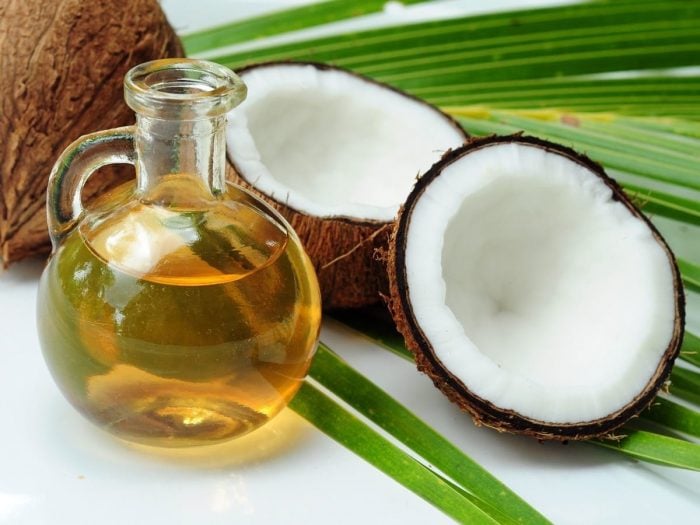The health benefits of coconut oil include hair care, skin care, stress relief, maintaining cholesterol levels, weight loss, increased immunity, proper digestion and metabolism, relief from kidney problems, heart diseases, high blood pressure, diabetes, HIV and cancer, dental care, and bone strength. These benefits of coconut oil can be attributed to the presence of lauric acid, capric acid and caprylic acid, and its properties such as antimicrobial, antioxidant, antifungal, antibacterial, soothing and others.
 |
How is Lauric Acid Used by our body?
The human body converts lauric acid into monolaurin which is claimed to help in dealing with viruses and bacteria causing diseases such as herpes, influenza, cytomegalovirus, and even HIV.
It helps in fighting harmful bacteria such as listeria monocytogenes and heliobacter pylori, and harmful protozoa such as giardia lamblia. As a result of these various health benefits of coconut oil, though its exact mechanism of action was unknown, it has been extensively used in Ayurveda, the traditional Indian medicinal system.
The Coconut Research Center has compiled various references on scientific research done on coconut oil.
Before I move on to the benefits of coconut oil in detail, let us understand its composition:
Composition of Coconut Oil:
Coconut oil consists of more than ninety percent of saturated fats (Don’t panic! First read to the last word. Your opinion may change), with traces of few unsaturated fatty acids, such as monounsaturated fatty acids and polyunsaturated fatty acids.Composition of Coconut Oil:
Virgin Coconut Oil is no different from this. Let us have a bit detailed study of this.
- The Saturated Fatty Acids: Most of them are Medium Chain Triglycerides, which are supposed to assimilate well. Lauric Acid is the chief contributor, with more than forty percent of the share, followed by Capric Acid, Caprylic Acid, Myristic Acid and Palmitic.
- The Polyunsaturated Fatty Acids: Linoleic Acid.
- The Monounsaturated Fatty Acids: Oleic Acid.
- The Poly-phenols: Gallic Acid, which is phenolic acid. These poly-phenols are supposed to be responsible for the fragrance and the taste of Coconut Oil and Virgin Coconut Oil is rich in these poly-phenols.
- Certain derivatives of fatty acid like Betaines, Ethanolamide, Ethoxylates, Fatty Esters, Fatty Polysorbates, Monoglycerides and Polyol Esters.
- Fatty Chlorides, Fatty Alcohol Sulphate and Fatty Alcohol Ether Sulphate, all of which are derivatives of Fatty Alcohols.
- Vitamin-E and Vitamin K and minerals such as Iron.

Coconut oil is one of the best natural nutrition for hair. It helps in healthy growth of hair providing them a shiny complexion. Regular massage of the head with coconut oil ensures that your scalp is free of dandruff, lice, and lice eggs, even if your scalp is dry.
Coconut oil is extensively used in the Indian sub-continent for hair care. Most of the people in these countries apply coconut oil on their hair daily after bath. It is an excellent conditioner and helps in the re-growth of damaged hair.
It also provides the essential proteins required for nourishing damaged hair. It is therefore used as hair care oil and used in manufacturing various conditioners, and dandruff relief creams. Coconut oil is normally applied topically for hair care.
Coconut oil is excellent massage oil for the skin as well. It acts as an effective moisturizer on all types of skins including dry skin.
The benefit of coconut oil on the skin is comparable to that of mineral oil. Further, unlike mineral oil, there is no chance of having any adverse side effects on the skin with the application of coconut oil. Coconut oil therefore is a safe solution for preventing dryness and flaking of skin.
It also delays wrinkles, and sagging of skin which normally become prominent with age. Coconut oil also helps in treating various skin problems including psoriasis, dermatitis, eczema and other skin infections. Therefore coconut oil forms the basic ingredient of various body care products such as soaps, lotions, creams, etc., used for skin care. Coconut oil also helps in preventing premature aging and degenerative diseases due to its antioxidant properties.
| Coconut oil |
There is a misconception spread among many people that coconut oil is not good for the heart. This is because it contains a large quantity of saturated fats.
However, coconut oil is beneficial for the heart. It contains about 50% lauric acid, which helps in preventing various heart problems including high cholesterol levels and high blood pressure. The saturated fats present in coconut oil are not harmful as it happens in case of other vegetables oils. It does not lead to increase in LDL levels.
It also reduces the incidence of injury in arteries and therefore helps in preventing atherosclerosis.
Weight Loss
Coconut oil is very useful in reducing weight. It contains short and medium-chain fatty acids that help in taking off excessive weight. It is also easy to digest and it helps in healthy functioning of the thyroid and enzymes systems.
Further, it increases the body metabolism by removing stress on pancreases, thereby burning out more energy and helping obese and overweight people reduce their weight. Hence, people living in tropical coastal areas, who eat coconut oil daily as their primary cooking oil, are normally not fat, obese or overweight.
Internal use of coconut oil occurs primarily as cooking oil. Coconut oil helps in improving the digestive system and thus prevents various stomach and digestion related problems including irritable bowel syndrome.
The saturated fats present in coconut oil have anti microbial properties and help in dealing with various bacteria, fungi, parasites, etc., that cause indigestion. Coconut oil also helps in absorption of other nutrients such as vitamins, minerals and amino acids.
Coconut oil is also good for the immune system. It strengthens the immune system as it contains antimicrobial lipids, lauric acid, capric acid and caprylic acid which have antifungal, antibacterial and antiviral properties.
The human body converts lauric acid into monolaurin which is claimed to help in dealing with viruses and bacteria causing diseases such as herpes, influenza, cytomegalovirus, and even HIV. It helps in fighting harmful bacteria such as listeria monocytogenes and heliobacter pylori, and harmful protozoa such as giardia lamblia.
Healing and Infections
When applied on infections, it forms a chemical layer which protects the infected body part from external dust, air, fungi, bacteria and virus.
Coconut oil is most effective on bruises as it speeds up the healing process by repairing damaged tissues.
Infections: Coconut oil is very effective against a variety of infections due to its antifungal, antiviral, and antibacterial properties.
According to the Coconut Research Center, coconut oil kills viruses that cause influenza, measles, hepatitis, herpes, SARS, etc. It also kills bacteria that cause ulcers, throat infections, urinary tract infections, pneumonia, and gonorrhea, etc. Coconut oil is also effective on fungi and yeast that cause candidiasis, ringworm, athlete's foot, thrush, diaper rash, etc.
Other
Liver: The presence of medium chain triglycerides and fatty acids helps in preventing liver diseases as they substances are easily converted into energy when they reach the liver, thus reducing work load on the liver and also preventing accumulation of fat.
Kidney: Coconut oil helps in preventing kidney and gall bladder diseases. It also helps in dissolving kidney stones.
Pancreatitis: Coconut oil is also believed to be useful in treating pancreatitis.
Stress Relief: Coconut oil is very soothing and hence it helps in removing stress. Applying coconut oil to the head followed with a gentle massage helps in removing mental fatigue.
Diabetes: Coconut oil helps in controlling blood sugar, and improves the secretion of insulin. It also helps in effective utilization of blood glucose, thereby preventing and treating diabetes.
Bones: As mentioned earlier, coconut oil improves the ability of our body to absorb important minerals. These include calcium and magnesium which are necessary for development of bones. Thus coconut oil is very useful to women who are prone to osteoporosis after middle age.
Dental Care: Calcium is an important element present in teeth. Since coconut oil facilitates absorption of calcium by the body, it helps in getting strong teeth. Coconut oil also stops tooth decay.
HIV and Cancer: It is believed that coconut oil plays an instrumental role in reducing viral susceptibility of HIV and cancer patients. Preliminary research has shown indications of the effect of coconut oil on reducing the viral load of HIV patients.
Finally, coconut oil is often preferred by athletes and body builders and by those who are dieting. The reason behind this being that coconut oil contains lesser calories than other oils, its fat content is easily converted into energy and it does not lead to accumulation of fat in the heart and arteries.
Coconut Oil in Your Kitchen
Personally, I use only two oils in my food preparation.
The first, extra-virgin olive oil is the best monounsaturated fat and works great as a salad dressing. However, olive oil should not be used for cooking. Due to its chemical structure, heat makes olive oil susceptible to oxidative damage. So for cooking, I use coconut oil exclusively.
And polyunsaturated fats, which include common vegetable oils such as corn, soy, safflower, sunflower and canola, are absolutely the worst oils to cook with.
Why?
1) Cooking your food in omega-6 vegetable oils produces a variety of very toxic chemicals, as well as forming trans-fats. Frying destroys the antioxidants in oil, actually oxidizing the oil, which causes even worse problems for your body than trans-fats.
2) Most vegetable oils are GM (genetically modified), including more than 90 percent of soy, corn and canola oils.
3) Vegetable oils contribute to the overabundance of damaged omega-6 fats in your diet, throwing offyour omega-6 to omega-3 ratio. Nearly everyone in Western society consumes far too many omega-6 fats -about 100 times more than a century ago - and insufficient omega 3 fats, which contributes to numerous chronic degenerative diseases.
There is only one oil that is stable enough to withstand the heat of cooking, and that's coconut oil. So, do yourself a favor and ditch all those "healthy oil wannabes," and replace them with a large jar of fresh, organic, heart-supporting coconut oil.
Hey enormous stuff or pleasant information you are offering here.
ReplyDeletethis site
Hiya, I’m really glad I’ve found this info. Nowadays bloggers publish just about gossip and web stuff and this is actually annoying. A good website with interesting content, that is what I need. Thank you for making this web-site, and I will be visiting again. Do you do newsletters by email?
ReplyDeletesun dried fruits online
Simply wish to say your article is as astounding. The clearness in your post is simply nice and i can assume you’re an expert on this subject. Fine with your permission let me to grab your RSS feed to keep up to date with forthcoming post. Thanks a million and please continue the gratifying work.
ReplyDeletecoconut oil for natural hair
Useful info. Hope to see more good posts in the future.
ReplyDeletewild rice